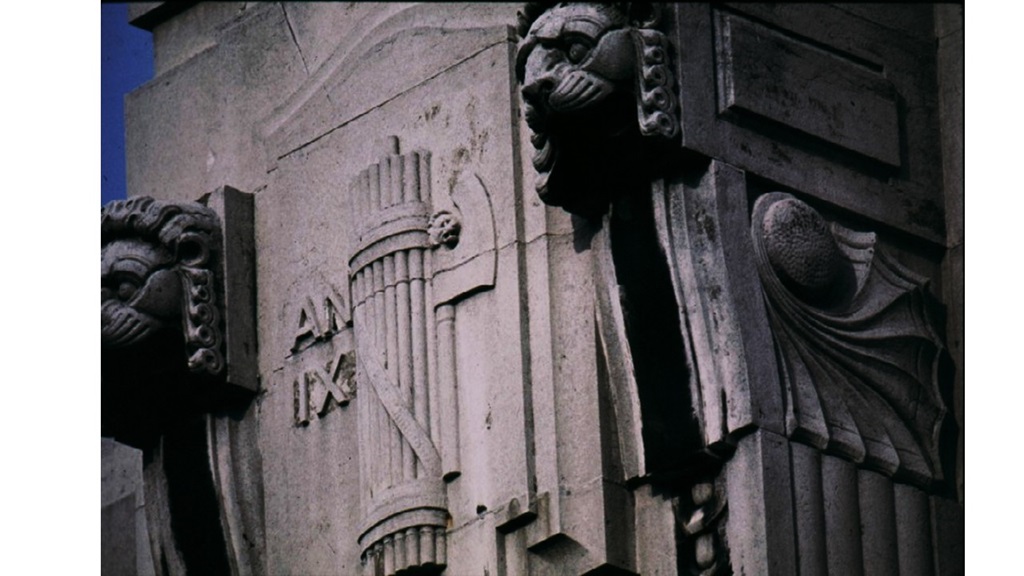.
Mussolini’s Minions
—Segesta, 2012
Entranced, we wander round the temple site.
The hot Sicilian sun beats down. I’m frayed,
now seek the parking lot’s uncertain shade.
My brother John’s nearby, though not in sight.
I spot a limestone post, eye-level height.
What are these bas-reliefs, chipped and decayed?
Focusing on the figures, I’m dismayed.
Bound rods, war axe: Il Duce’s always right.
I stare in wonderment, reach out to feel.
From out of nowhere, several huge black bees
buzz angrily, dive bombing toward my face.
Panicked, I topple, scrape my arm, and squeal.
John’s here. He helps me up. Habitual tease,
he quips: Hah! Blackshirts still police this place!
.
.
Mary Jane Myers resides in Springfield, Illinois. She is a retired JD/CPA tax specialist. Her debut short story collection Curious Affairs was published by Paul Dry Books in 2018.















Fascinating observation of travelers with historical knowledge and insights so well expressed.
Thank you Roy. This sonnet is based on an actual experience. I love the “compression” of the sonnet form. It forces us to focus on the “heart of matters.”
Most sincerely,
Mary Jane
A killer last line for the killer bees.
I enjoyed your well-constructed sonnet, letting us in to see a glimpse of your life, Jane. Impeccably readable.
Thanks for the read.
Thank you Paul for your encouraging comments. Sonnets are a challenge!
Most sincerely
Mary Jane
A great comic sonnet, and Paul is right about that very striking last line. It’s unexpected, and funny!
The Fascist symbol of the bound lictor’s rods and axe (called “il littorio” in Italian) appears here and there in Italy in architectural and monumental survivals from that period (1922-1943). In the illustration that Evan has put up, the marks “AN IX” mean “Year Nine” or 1931. Mussolini ordered that a new count of the passing years should start from 1922, when his party came to power.
I was going to ask what the “nine” meant. Thank you Joseph.
Joseph
Thank you for your encouraging remarks. This sonnet is based on an actual travel experience.
My brother John is great to travel with as he knows military history, a subject in which I am lamentably deficient. Without his instruction, I would not have understood the significance of that rods- and- axe symbol. John also pointed out many WWII era machine gun nests.
We traveled in April 2012, and there were many Garibaldi exhibits(150- year celebrations). Other than having read Il Gattopardo (The Leopard) by Lampedusa and I Viceri (The Viceroys)by Roberti, both in translation, I have very little knowledge of the Risorgimento. Typical of me to absorb information through “fiction”–John knows “the facts”!
Most sincerely
Mary Jane
It would have been an amusing tourist incident anyway, Mary Jane, but the final quip is the flourish that makes it more than an ordinary sonnet. Well done, including recognition of how helpful brothers can be, and a corresponding catchy title of your own.
Dear Margaret
Thank you for your kind remarks. I enjoyed writing this sonnet. It’s a challenge to compress a “real-life” incident into an artfully written 14 lines.
Most sincerely,
Mary Jane
Thank you for your poem Mary Jane. It led me to do some research on the Sicilian Black Bee. Apparently you had the misfortune in all those archeological sites(that the Fascists added their symbols to) to run into the bad boys of honeybees. Due to the genetic problems they now have, the Sicilian beekeepers gave up on them and imported different bees from Northern Italy for honey instead. I’m sorry you had such an incident spoil your vacation a little. but it inspired a poem I will remember.
Dear Frank
Thank you for your kind comments. I am gratified that you researched these creatures. I have a tendency to “over-react” when I encounter stinging winged Hymenoptera. I’m glad to know that in this case the aggressive behavior of these bees was not merely in my imagination!
The injuries I sustained on my leg from my fall were actually a bit worse than I describe in the poem. It’s a challenge to sustain injuries while “far from home.” All’s well that ends well! and the incident is now a comical memory.
Most sincerely
Mary Jane
A very memorable poem, Mary Jane — especially the sight of bees “dive-bombing” toward your face. It’s an image that would be hard to forget.
Dear Cynthia
Thank you for your kind comments. Yes, I was quite discombobulated by those aggressive bees!
Sincerely
Mary Jane
Not only this well-constructed sonnet but its title, too, made me giggle. I love the frayed-shade rhyme pair, and the flow of this piece seems effortless. The witty last line is everything! Thanks for the read, Mary Jane.
Dear Shamik
Thank you for your kind remarks. It was a great deal of fun to construct these 14 lines!
Most sincerely
Mary Jane